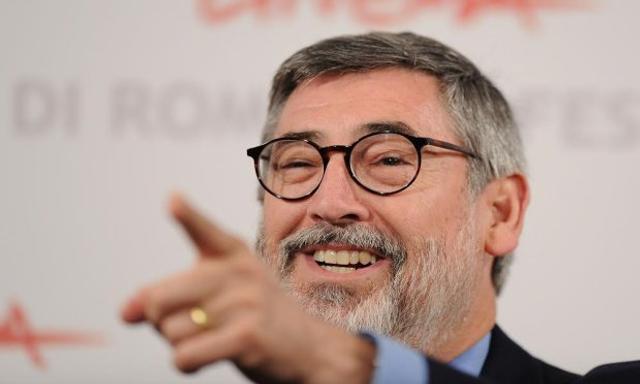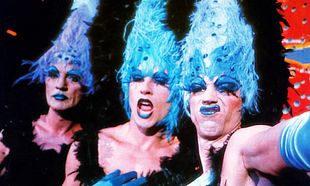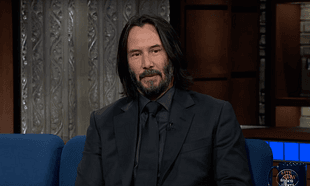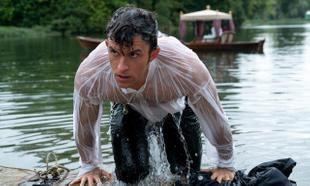In Conversation With... is our interview series where we talk to someone of the most well-known and respected actors and directors about their career, filmography, influences, what they make of the industry nowadays and everything in between.
John Landis is known for his work on such seminal comedies like The Blues Brothers, Trading Places, Coming To America, Animal House and horrors like An American Werewolf In London and, of course, Michael Jackson's Thriller.
John Landis will be in Dublin this Wednesday along with Peter Bernstein, son of famed composer Elmer Bernstein, for Elmer Bernstein: 50 Years Of Film Music. The concert, which takes place at the National Concert Hall, will see the RTE Concert Orchestra perform some of Elmer Bernstein's most famous work, including The Magnificent Seven, Walk On The Wild Side, To Kill A Mockingbird, as well as his work with John Landis and some of his music recorded here in Ireland. For more information as well tickets, visit the NCH's website here.
So, where have you been? Are you retired? Are you working on new things?
(laughs) Well, I'm not retired. (laughs) Very luckily, I don't have to work - but I like to work! I'm working on a number of things, but it's all a question of money!.
We'll cut to something a bit more recent, and something I'd like to get your opinion on because I know it's something close to your heart - any thoughts on The Mummy remake and Universal's Monsters / Dark Universe? Have you been following it?
It hasn't got good reviews. Has it opened? Not opened, I mean how it's doing.
It's done $32 million so far in the US box office.
That's not good?
Well, I'll put it to you like this - you remember Brendan Fraser's The Mummy?
Oh sure, they were big hits.
Well, there was a spin-off called The Scorpion King and that opened at $36 million, so that'll tell you how well it's doing. Wonder Woman's still the No.1 at the US box office.
I saw Wonder Woman last night, actually! Have you seen it? I thought it was good, I really liked her - she (Gal Gadot) was wonderful, really charming and beautiful. She really sold it. I was very impressed with the girl - the woman!
She was an Israeli soldier before she started acting.
Well, she's Israeli! They're all soldiers! (laugh) You make it sound like that's an unusual thing! (laugh)
It's an unusual thing in Ireland, I guess!
There you go. In Israel, everybody has to go into the army, so the fact she was a soldier - it sounds good! My goodness, she was a soldier! (laugh)
Well, let me ask you this - what do you make of the shared universes in major blockbusters nowadays?
First of all, it's not a new idea.
If you remember with Universal back in the '40s, once they made all their classics, they started cross-pollinating. House of Dracula, House of Frankenstein, Frankenstein Meets The Wolf-Man - you know what they used to call those? Monster rallies! (laugh) And then of course, one of the great ironies is what was considered... OK - it's over now!... was Abbot & Costello Meets Frankenstein, which is actually a very funny movie and very respectful of the monsters. I think, y'know, maybe that's one of the problems with Universal's Dark Universe is that it isn't respectful of the monsters.
Y'know, when they want to reinvent and sometimes it works great - look at David Cronenberg's The Fly or John Carpenter's The Thing. It can be done.
I'm just... truthfully, I'm bored shitless with the Marvel Universe now. All the superhero movies tend to be interchangeable, you always have these mass destruction of cities and huge computer-generated extravaganzas to the point where you could take a reel from any of the Marvel superhero movies and put it any of the others and nobody would notice. They're very well-made, it's just they're the same thing over and over again. But, I don't know, people are showing up. One of the reasons Wonder Woman has been received so well by the critics is that it doesn't destroy cities! (laughs) Even the superhero stuff is on a very human scale, it's the gods! We're not seeing skyscrapers tumbling! (laughs)
It's funny, you see actors like David Thewlis and Danny Huston involved in these films and it's sort of like John Huston in Battle For The Planet Of The Apes, which you were in.
I've got a story about that!
I was sitting having lunch with the apes, I was a human slave - and my part was cut out! (laughs) The story was I was having lunch at the Malibu Ranch, it's a public park now, where they were shooting. I'm sitting at along picnic table with a bunch of apes, and y'know, people (laughs) and sitting about four feet away from me was an orangutan, smoking with one of those long cigarette holders and reading.
I didn't speak to him, but about ten minutes before lunch was done, an AD came up to him and said, "Mr. Huston, we're ready for you now." And he said (in John Huston's voice) "Alright, I'm coming!" (laughs) I just had lunch with John Huston and I didn't know it! I got to him know later, but I asked him why he was in, y'know, Battle For The Planet Of The Apes? And he said (in John Huston's voice), "Oh well, J. Lee (Thompson, the director) asked me..." But you have a real part, why'd you do that? And he said, "You take the money, kid!" (laugh)
But the truth is, all these actors - they're getting big stars and I think it's a job, they're actors - they wanna work!
You probably know this, but John Huston lived in Ireland for quite a while and there's a film school in Galway named after him.
I knew he lived in Ireland, I didn't know there was a film school! He was very... My personal experience with him was that he was a very good guy. I understand through Anjelica (Huston, his daughter) that he wasn't the best father and he certainly was a lousy husband, but my experience was that he was just charming and generous and kind. I really... he was wonderful.
We're talking about John Huston, who had a third act, if you like, in his career where he was doing these kind of genre films and Elmer Bernstein had the same with comedies with you and the Zucker Brothers in Airplane.
Yeah, Elmer scored a couple of comedies in the '50s before he did Animal House. This performance we're doing with Peter Bernstein, I went to school with Peter. In fact, in 1965, Elmer took us to see The Beatles at the Hollywood Bowl when I was 15, I remember it very well! When I was starting off, I'd made a couple of independent movies and when I was making my first major studio film, Animal House.
We were the lowest-budget film they'd made in eight years and we finished and the head of the music department at Universal looks at me - I had long hair and a beard, I was 27 at the time, y'know - and asks who I want to score the film and I said I'd like to ask Elmer Bernstein. And he said - and I'll never forget it - Elmer Bernstein won't even return your call. (laughs) And I stood there and thought, oh yeah?!
He came in, watched the movie and said it was very funny, but, y'know, what do you want me to do with this? I said, I'd like you to score it straight like it's a very serious melodrama no matter what's on screen. Up until that point, the tradition was to do it comedically. An excellent example is Henry Mancini's terrific score for The Pink Panther. It's comedic, it's called wah-wahhh music which was the way all comedies were scored.

John Landis on the set of Animal House with John Belushi and Bruce McGill
So when Elmer scored Animal House seriously, it was a major departure and he did it brilliantly, he understood exactly what I wanted and the picture became a big success and his score changed comedy scoring. Two or three years later, he did Airplane, then he did Ghostbusters, he did Stripes, he did Three Amigos, he did Trading Places, he did these huge hit comedies for years! Elmer was so prolific and so brilliant at what he did that he became typed, just like directors and actors, composers can get typed!
With The Ten Commandments and Hawai'i, he was Mr. Epic. He was the innovator who did a full jazz score, the first person to do it, with The Man With The Golden Arm. And then he was Mr. Jazz! He did Sweet Smell Of Success and then he did one Western - The Magnificent Seven - that was such a smash... Well, the movie wasn't a hit, it grew with time, but his score! What's so interesting is that he went on to score about ten Westerns, he did True Grit, The Commancheros, then he was Mr. Western! He did small dramas like To Kill A Mockingbird and then, in his late sixties, I asked him to do Animal House! (laugh) It got to the point where he was only being offered comedies, he called me up and said, "You bastard!" (laughs)
Peter will talk about this in our performance, but he just stopped for about three years. He said, "I'm not gonna take another comedy, but I can do anything. I wanna do serious," and you'll hear this story that - it's a wonderful story, a very Irish story concerning Noel Pearson (the producer of My Left Foot and The Field) - and then he started working with Martin Scorsese.
That's right, didn't he do the score for Scorsese's remake of Cape Fear?
Yeah, he adapted and re-orchestrated the score from the original by Bernard Hermann. I don't want to ruin it, but you'll hear a very funny story about Bernard Hermann. I'll tell you something that's part of my talk is... he's the only person to have been nominated for composing for, let's see, in the '50s, '60s, '70s, '80s, '90s and into the new century with Far From Heaven in 2003 or 2004. The breadth of his career is extraordinary and his background... I gotta tell you, my friend and collaborator on this, Peter Bernstein was a gifted composer himself and he's done something really special for the show in Dublin - but I don't want to give it away.
Aside from Elmer Bernstein's scores, one of the interesting things about some of your films - especially An American Werewolf in London - is how you've used popular music as a part of the story. Did you write the script to the song, or how did it work?
It depends. In An American Werewolf In London, when I wrote it, pop songs weren't really used in movies. They were performed in the film, but the movie that really started the trend of using pop songs as soundtrack - people think it's George Lucas and American Graffiti, but in fact, it was Mike Nichols and The Graduate. He basically scored the film with Simon & Garfunkel songs written for the film, but nonetheless, it was sort of new. Then, of course, George Lucas with American Graffiti, he used Wolfman Jack as a sort of Greek chorus and used the radio as, y'know, source music. But with An American Werewolf In London, I wrote that in '69 and all the songs are indicated. I was unable to get three of the songs I wanted.

Rick Baker, David Naughton and John Landis on the set of An American Werewolf In London
What were they?
It was two versions of Blue Moon, one by Bob Dylan on his Blue album. I had many versions of it in the film and Bob Dylan did a beautiful cover of Blue Moon, and Elvis Presley did a cover of it on one of his early records. It's extraordinary, he yodels and it's kind of weird and I wanted to use it and... the Colonel, Elvis had passed, well, the Colonel was a crook whereas Bob (Dylan), at that moment, he had become a kind of born-again Jew and he didn't want his film in an R-rated film. The other song was Moon Shadow by Cat Stevens and it's a wonderful and beautiful song, but if you listen to the lyrics, it's about dismemberment and I wanted to use it! At that time, Cat Stevens had reverted to his original name.. Yusuf... well, basically, for the same reasons as Bob Dylan - religious reasons! He didn't want his music in an R-rated film.
It's funny incidentally, I was thinking about Thriller, and that Michael Jackson had to put that disclaimer up in front of it...
Well, that was because we made the film - by the way! Thriller! When I made Thriller, I really need some scary music and I called Elmer. If you look at the credits, it says scary music by Elmer. It's very like in The Blues Brothers when I needed God music and Elmer did The Ten Commandments, and he's got a credit on The Blues Brothers for God music! (laughs)
But Michael, when we made that he was still living at home and Catherine, his mother's father, his grandfather, was a deacon or something in the Jehovah's Witnesses and the church was unhappy with the film, they thought it was Satanic and they really gave him a really hard time and that disclaimer - well, I actually wrote that disclaimer (laughs) - that was a sop to the Church to basically say... fuck off, basically! (laughs) Like everything Mike did, what was amazing is... I was thinking, "Oh, this is ridiculous!", and of course, it caused controversy when people read it! He had this unerring gift for promotion and publicity! Years later, I did another film with Mike...
Michael Jackson's Thriller, directed by John Landis
Ghosts, was it?
No, no, no Ghosts was terrible... Black Or White, that was it, which is interesting because Michael was such a monster star at the time, it premiered in 126 countries at the same time so some people watched at two in the morning, some watched at three in the afternoon. It had one of the largest viewing audiences, it's something like the Moon Landing and two other things ahead of it. But, it's funny, we were shooting it and my wife, Deborah (Nadoolman Landis), is a brilliant costume designer and she did Thriller and she did all my films and she did Raiders Of The Lost Ark.
So, on Black Or White, one of the PAs had fallen off his bike and injured his arm and he was wearing one of those... I don't know what they're called, it's a band-aid, it laced up, it's like a gauntlet or something. Michael saw it and was like, (in Michael Jackson's voice) "What's that?!", and the guy told him and he asks if he can have it and the guy says... Sure...? Michael came over to me and asks, "John, can I wear this?", and I looked at... why do you wanna? What? So I called my wife over and asked her, and she looked at me and she said, "Sure! Michael will wear it and they'll start wearing them as a fashion item," and they did! That was him, some of the weirdest things and they turned out well! (laughs)
Let me pivot for a second. We're talking about Animal House and Blues Brothers - and we've got a framed poster of it up in our office...
Really?
Yeah, our recording space has a framed poster up on the wall.
Oh wow.
I suppose my question is, what do you make of the current types of comedy?
Well, some are good, some are bad - but that's always been true.
Do you think we're losing something? Is something missing?
Oh gosh, it takes time to comment on that.
I think most comedies made are forgettable. I really liked Bridesmaids. But there are comedies that are very funny. People forget that comedy and horror are the two genres that get the least respect and are by far the most difficult and they're completely unforgiving! You see a horror and it either scares you or it doesn't. You see a comedy and you either laugh or you don't. Both of these are involuntary, physical responses, y'know? It's interesting and both of them, well, movies are meant to be seen on a big screen with a lot of people. It's a communal experience. The more people you watch a movie with, the better the experience - especially in a comedy where laughter is contagious. It's like, fear is contagious. A scary movie is far scarier in a crowded cinema! (laughs) It's bizarre, most people watch movies now on their laptop, it's a strange phenomenon. But, yeah, there are comedies I like, I'm trying to think...
Do you watch TV comedy?
Oh, there's wonderful things on TV. Always has been. Very funny shows. But in terms of the movies, yeah, but I think as a general rule, films in general - I mean, mass-market stuff - the business has changed dramatically. Let me put it this way...
Nobody's making anything original.
Thank you. (laughs)
What's happening is the studios now will make a film for $150, $200 million but they're afraid to take risks. You asked me about the Dark Universe, if you're gonna make a movie of The Mummy, why the fuck do you need Tom Cruise and Russell Crowe?! As soon as you announce that Tom Cruise is in The Mummy, you know you're not going to see a horror picture! It's not gonna be The Mummy, it's going to be the Tom Cruise Show. I don't know.
What no one understands, ideas are a dime a dozen. An idea has no real value. It's all about the execution of the idea.
The best film in two years is probably Moonlight. I thought that was fucking brilliant. It didn't need a big budget. It was an independent, they were working with less money, but it didn't need it. You look at a studio. Moonlight, with all its acclaim, what it's gonna make? $25 to $30 million? They're not in that business. What's happened, and it's complicated, it has to do with all the studios are now part of huge conglomerates, they're multi-national corporate entities, they take less and less risk. In retrospect, I realise how lucky I am to have worked in the '70s and '80s when studios were still run by individuals.
But is that actually true? Wasn't Paramount owned by Gulf+Western?
Yeah, but Charlie Bludhorn was the studio. Universal was owned by MCA, but Lew Wasserman was the studio, United Artists was Arthur Krim, Warners was Steve Ross - these were guys who said yes or no. Now, every studio has a green-light committee and it has a great deal to do with marketing.
One of the things that people don't understand is the cost of motion pictures hasn't risen that much. Because of new technology, the irony is that it's easier and less expensive, however getting a movie in a movie theatre, into cinemas, has become extremely difficult and very expensive. For instance, Animal House cost - with studio overhead at 25% - $2.3 million. Now, that picture would cost... $9 or 10 million... so it's not the cost of the movie. What has changed dramatically is to promote and market Animal House, they probably spent $1 million. Now, you can't open a movie nationally - let alone internationally, because of piracy - but the marketing costs are now gigantic! If Animal House was made now and cost $9 million... I'll give you a better example - have you seen Get Out?
I did, and I loved it!
Great movie. That cost a little under $5 million. Know how much they spent to open it?
I'd guess and say around the same as the production budget.
They spent $38 million.
Jesus.
It had a major studio release and to do a major studio release, it's thousands of cinemas.
This is what's different and no one understands. To release a film now, like The Mummy? They're gonna spend $50 to $60 million - and that's on top of the production costs! So with a film like Get Out, which only cost a little under five, well, actually, they're going to have to recoup more than fifty to break even! When I made Animal House, there were only three national networks in the US. ABC, CBS and NBC. There were only three that were national at that time.
Now, I've DirecTV and I think I've got 620 choices. Think about it. When you bought a commercial, a TV spot for Animal House on The Tonight Show With Johnny Carson, that was seen by 40 million people a night on NBC. Now, a hit TV series is seen by, at most, 17 or 18 million people. A hit series is considered one million viewers. So, the cost of reaching those people has become exponentially expensive. Plus, when you bought a thirty-second spot with Johnny Carson, it cost about $100,000. When you buy a thirty-second spot nowadays, it's millions.
Those things really impact the courage of the studios because they're in the business... one of the reasons why Hollywood is so extraordinary, you had RKO, Paramount, MGM, Fox, all these major studios and each company produced 50 features a year for close to 50 years. You look at old studio movies, half of them are great! (laughs) It's incredible how good of most of those movies are. It's remarkable! But the economics were completely different.
It's that famous thing that Irving Thalberg insisted on was that, he said, "We make 52 features a year here at Metro, countless shorts and newsreels, but fifty-two features a year. I'm going to make forty-nine features for the public and three features for me." (laughs) Meaning we can afford it. So they'd try to make three, y'know, unusual and artistic films. They'd spend the money. They'd take the risk. Now, no company would take the risk - because they can't afford it.
The only people I see taking a risk is either Netflix or Amazon.
But they're not taking the risk. Well, Amazon is because they're making feature films. Netflix are making product for Netflix. That's not a risk.
They put it on their channel and it stays there. They make their money through subscriptions. Like, HBO makes Game of Thrones. Game of Thrones - which I think is terrific - costs a fortune! Shot in Ireland by the way! What's wonderful is the international success of that show brings hundreds of millions of dollars in subscriptions to HBO, so even economically, you might think that doesn't make sense, yeah it does because think how many people watch that show on HBO!
In the old days, the studios... there's this misnomer that the studios own the cinemas. The cinemas own the studios! Loew's Theatres owned MGM. Fox Theatres owned 20th Century Fox and the reason for that was that they had to keep stocking the shelves! New movies came out every week, you needed the movie. The other model that's different, very different, there was no television so people went to the movies!
Now, not only television, but you've got the internet and the internet is... it's great, but it's also insidious for many reasons and one of them is that it's kind of destroyed the idea of intellectual property. You have two generations of people, my children certainly... if you got a link from someone to the new Star Wars movie, you would click that link and watch the movie, and it wouldn't occur to you that you're stealing! People don't think of it as theft. If someone got a black market copy of Game of Thrones from next season, and you had the opportunity to see it, you wouldn't think that I'm stealing from HBO or taking money out of the hands of those Irish workers, it doesn't even occur to people! It's just reality.
I know I sort of asked this before, but has all this made you disinterested in making films now?
Absolutely not.
Movies are wonderful, they always will be and there'll always be people making good movies. For every ten or fifteen bad low-budget horror films you'll see, you'll also see Get Out. I love movies. I really do, and I think there's an incredible amount of good work out there. But, most of it's shit like always! (laughs) It makes it more difficult to try to get money for something of quality. I look back at my filmography and I would say, a third of those films I could not get made now.
It's just different times. It's not a bad thing, it's just reality! It keeps evolving. I love making movies, I love every part of the process, I love going to the movies, it's just... when you talk about the Monster-verse, or complain about remakes or sequels, there's always been remakes! The thing about the industry is that it's a business! (laughs) It's a very strange kind of schizophrenia going on. Do you make the decision that makes your film more commercial or do you make the decision that makes your film better?
I think you'd agree though, in the last fifteen years, the balance is off. There are way more films nowadays that seem more concerned with reaching the widest audience possible and making it as broad as possible.
Oh sure, but that's always been true. It's just that you're seeing it because there were fewer films. It's ironic because, there are many more films because it's so easy to make a movie now. You can make a serviceable feature with an iPhone and a laptop! Did you see that movie...
Tangerine!
That's right! It was terrific.
So, it's really down to the execution and there'll always be good movies, the same there'll always good books and good paintings - but the vast majority of books and paintings aren't good! It's the nature of art! I feel very lucky to have been able to be in the business, I still like working, I still work all the time - but you don't know it because it's commercials - but I'd rather do something... I've got, like, three or four I'd like to make, but they're not what would be considered mainstream. Coming To America is, believe it or not, my most successful film commercially. Would a studio make a film like that nowadays?
Well, I could imagine... I don't know, Kevin Hart or someone play the role of Eddie Murphy or something.
Well, you could imagine - but are you seeing it? That movie was a real risk for Paramount. It's interesting, they were willing to take the risk. What really happened in 1969 with Easy Rider was that the studios were being buffeted and dwindling audiences. 20th Century Fox had to sell the backlot just to say alive and now it's Century City. When I worked there as a mailboy, there were Western towns. My point is that, the studios were struggling, and along came this independent movie called Easy Rider that made over $100 million dollars and they went, what the fuck?!? (laughs)

John Landis on the set of Coming To America with Eddie Murphy
Suddenly, really throughout the '70s and '80s was a remarkable time because the studios treated the filmmakers with great respect. They figured the director is the guy making the movie, we'll let the director make the movie. Robert Altman and Hal Ashby made these really personal movies and that's not happening. Just look at the output, it's unbelievable how many great films and it's just... a different time. Listen, I'm optimistic. There's real joy in seeing a good movie. I'm very happy and surprised and delighted that there's so many films of mine that still generate income.
It's funny actually, Black Panther made its first teaser this week and I saw online people sort of drawing lines between it and Coming To America.
I do know 'cos they sent me pictures! During the shoot, the cast had a big Coming To America party and they all got dressed up in copies of my wife's Deboarah's costumes! (laughs)
I don't know, I'm always optimistic. It's like that story of the kid in a room full of shit and he's digging through it, and his father asks what he's doing and he says, I know there's a pony in here!
This interview has been condensed and edited.
For more from our In Conversation interview series...
In Conversation With... John Carpenter
In Conversation With... Richard Donner & Lauren Shuler Donner










































































